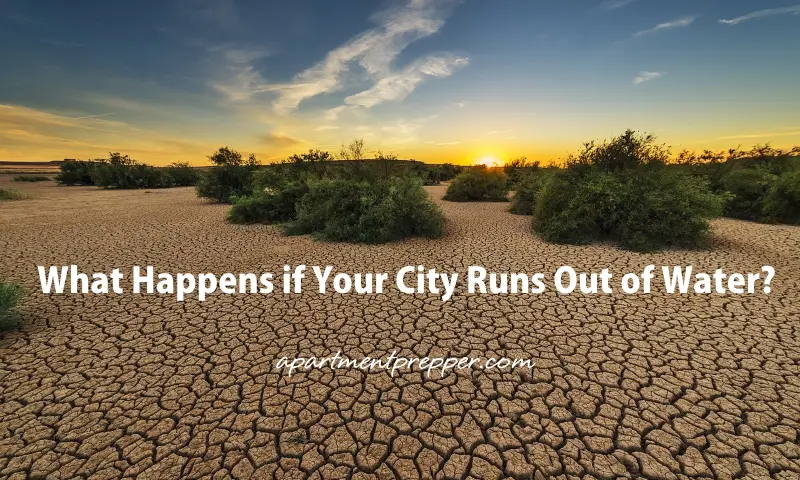This post is by Bernie Carr, apartmentprepper.com
I was checking out various news sites and learned about the latest crisis in Capetown in South Africa. The city is rapidly running out of the water, because of a prolonged drought brought about by El Nino conditions. Their water crisis has gotten so bad that officials are expecting to see supplies run about by April 12th if usage continues at the current rate. April 12 is being named as Day Zero, an actual “point of no return” date that they may actually be unable to support their population.
City officials have been warning residents for a while now, but people have not been cooperating. Now everyone is being asked to use only 50 liters or 11 gallons of water per day.
How much water does an average person use?
According to USGS.gov, an average person uses 80-100 gallons per day. 80 to 100 gallons! Cape Town residents are being asked to use only 11 gallons. That includes water needed for drinking, cooking, flushing the toilet, brushing, taking a shower, washing dishes, watering plants and pets. Here is a rundown of what each activity normally uses according to USGS:
| Bath | A “full tub” varies, but 36 gallons is a good average amount. |
| Shower | Old showers used to use up to 5 gallons of water per minute. Water-saving shower heads produce about 2 gallons per minute. |
| Teeth brushing | Less than 1 gallon. Newer bath faucets use about 1 gallon per minute, whereas older models use over 2 gallons. |
| Hands/face washing | 1 gallon |
| Face/leg shaving | 1 gallon |
| Dishwasher | 6-16 gallons. Newer, EnergyStar models use 6 gallons or less per wash cycle, whereas older dishwashers might use up to 16 gallons per cycle. |
| Dishwashing by hand: | About 8-27 gallons. This all depends on how efficient you are at hand-washing dishes. Newer kitchen faucets use about 1.5-2 gallons per minutes, whereas older faucets use more. |
| Clothes washer | 25 gallons/load for newer washers. Older models might use about 40 gallons per load. |
| Toilet flush | 3 gallons. Most all new toilets use 1.6 gallons per flush, but many older toilets used about 4 gallons. |
| Glasses of water you drank | 8 oz. per small glass (not counting water for Fido or your cats). Also, note that you will be using water for cooking. |
| Outdoor watering | 2 gallons per minute, depending on the force of your outdoor faucet. |
What happens when your city runs out of water
Let’s look at what is happening in Cape Town now:
- Tap water will be turned off on April 12 if usage rates continue
- People are buying up water containers such as storage tanks, buckets and anything they can get their hands on to store water.
- When April 12 is reached, the only areas that will continue to receive some tap water are designated to be hospitals, schools, the central business district and poor areas.
- When the tap is turned off, people will be forced to line up for daily water rations, which will be 6.6 gallons.
- Police and military are making contingency plans involving storing water in military basis to maintain security when water no longer flow to the tap.
I think the prospect of an entire city running out of water is a scary one. Mass panic and chaos can result if people are not able to get this basic need.
What does all this have to do with me?
We are in the U.S. so there can’t possibly be a water crisis here, can it? There is not a lot of discussion about having water issues, but yes, a water crisis can happen. We all recall the recent droughts in California, as well as Texas, and the water contamination in Flint Michigan. As cities experience lower water supplies, the cost of water goes up for their residents. It is already happening in various areas now.
What can we do about it?
I am not trying to start a panic, but we are all about preparing for emergencies. Part of being prepared means being aware of issues before they become problems.
Check out your state’s water situation and find out about challenges happening right now. This State Water Facts site by the EPA is a good place to start. Just find your state in the drop-down menu.
Learn to conserve water now. Find ways to cut down your water usage now, while we are not in any crisis. It’ll do you good in terms of saving money on your water bill, and develop good habits in case of a disaster or water shortage.
Boost your water supply for emergencies. The usual recommended amount is one gallon per person per day, but we all know this amount is the bare minimum. This means having water for drinking and cooking. If you have the room, try to set aside additional water if possible, for hygiene and cleaning.
Learn everything you can about water and survival. Do your own research, or read Daisy Luther’s book, The Prepper’s Water Survival Guide.
Hopefully, the people of Cape Town are able to reduce their water usage now and avert Day Zero. All we can do is pay attention, learn what we can, prepare for the worst but hope for the best.
© Apartment Prepper 2018

